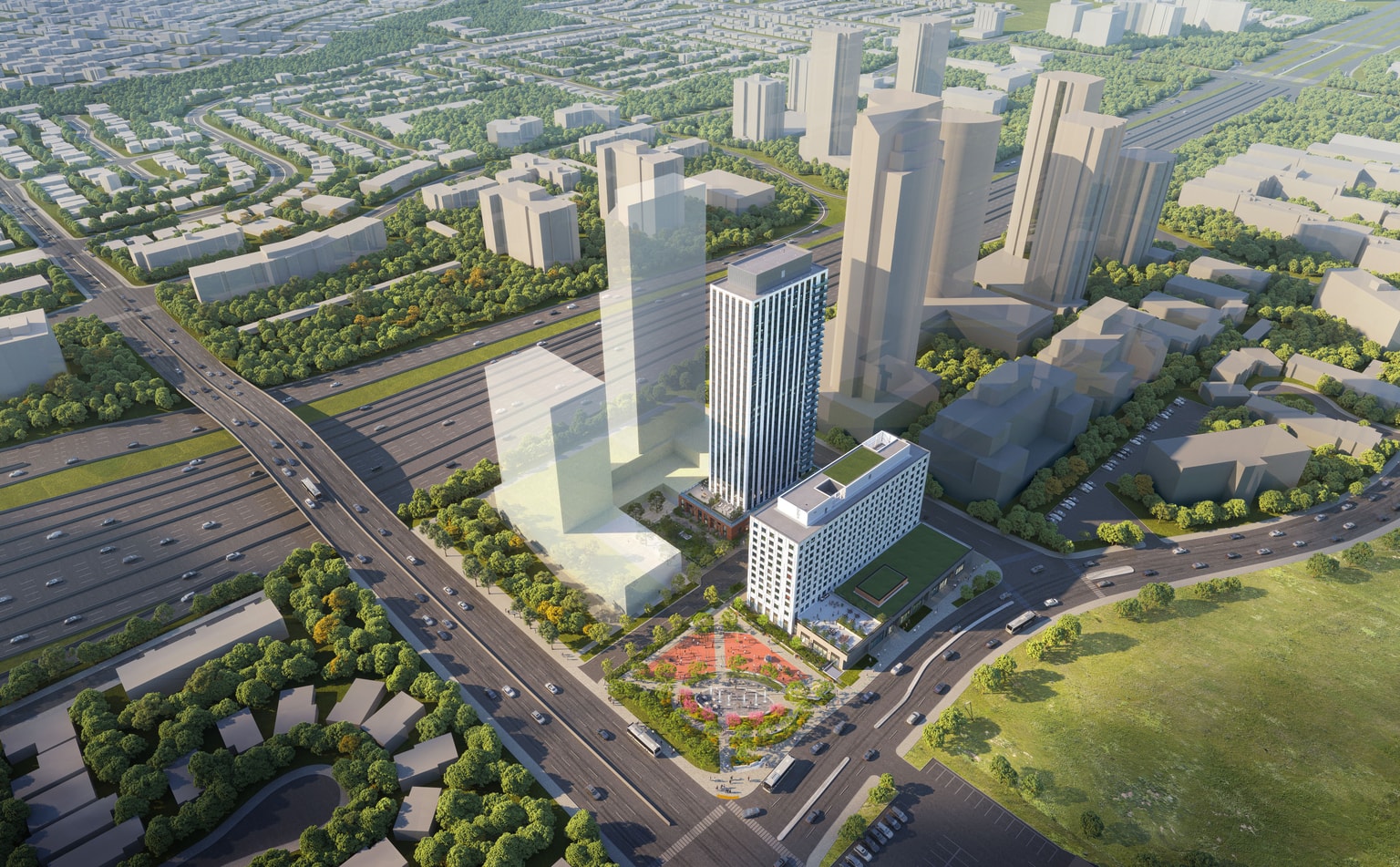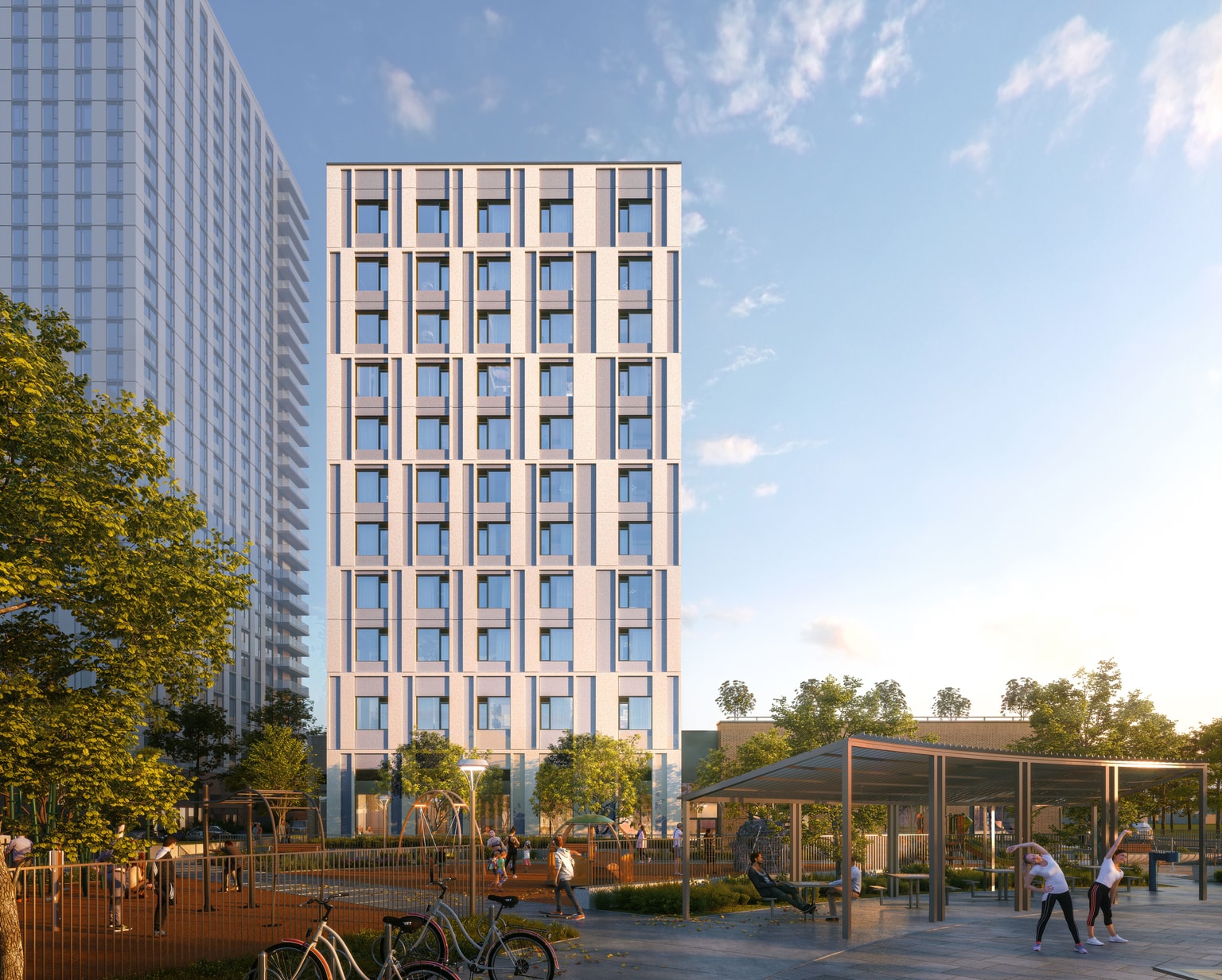Innovation that reduces costs and builds value
Developers across Canada are rethinking how to deliver housing. As policy shifts encourage long-term rentals over speculative condos, purpose-built rental (PBR) is emerging as the new frontier in residential development.


The question is now how to build faster, smarter and more affordably without compromising quality or sustainability.
Modern Methods of Construction (MMC) is an innovative approach that uses modular design, precast systems, off-site prefabrication, all delivered through efficient digital coordination. For developers who are concerned with both operational efficiency as well as construction costs, this architectural innovation combines efficiency, sustainability, and cost certainty to create housing that performs better and delivers faster.
Valhalla Village in Toronto is a standout example of a transformative mixed-use development, designed to meet the CaGBC Zero Carbon Green Building Standard while delivering hundreds of affordable homes through a fully modular precast system. It exemplifies how MMC is reshaping both the construction process and the financial equation for developers and stakeholders involved.

Compared to conventional concrete-builds, MMC relies on a more coordinated drawing set minimizing errors and changes on site. Developers can predict a more precise initial costing estimates with infallible construction schedules. The bulk of the building structure, envelope, and integrated sleeves for mechanical systems at Valhalla Village were coordinated very early in the process and finalized off-site in a controlled environment. Columns, beams, precast façade panels with window assemblies were all fabricated in the factory before breaking ground. There was no ‘we’ll deal with it on site’ - all major decisions were made before fabrication. Substantial coordination tasks like windows, elevators, and roof anchor shop drawing reviews were completed prior to construction. This eliminated costly site surprises and reduced coordination delays that typically balloon budgets mid-construction.
Compared to a comparable conventional build, the result:
- 3–4 months saved on design coordination,
- 12–18 months shaved off total construction time; and
- 30–40% reduction in contract administration (CA) costs.
For developers, this drastic reduction in timeline to market translates into faster lease-up, quicker returns, and reduced carrying costs.
By integrating design, engineering and manufacturing early, Valhalla Village streamlined delivery across all disciplines. Compared to conventional projects, the modular precast system reduced on-site labour from 20–30 workers per floor to only five. Fewer workers and trades on site meant fewer safety risks, less congestion and lower overheads. In an industry where margins are tight, MMC’s condensed delivery period allows developers to redirect funds into other avenues.
While MMC often carries the misconception of higher upfront costs, this project proved otherwise. After evaluating mass timber, conventional concrete and total precast systems, MMC emerged considerably cheaper than traditional construction at the time, even before factoring in the time savings and reduced CA fees. All elements considered, MMC emerged as the most cost-effective delivery model with fewer variables, fewer trades and greater certainty in both budget and schedule.

In addition to timeline reduction in construction, MMC contributes to carbon reduction and construction risk management. Prefabrication in factory-controlled environment minimizes waste, ensures consistent quality, and eliminates weather-related delays. Workers operate safely indoors rather than on scaffolding in mid-winter, and trades can inspect systems without stepping onto high-rise exteriors. At Valhalla Village, the use of hollow-core precast slabs cut both concrete and rebar use, reducing embodied carbon and volatile material costs while maintaining thermal and acoustic performance. MMC delivers a safer, cleaner, and more predictable project with fewer unknowns, an increasingly rare advantage in today’s construction landscape.
Beyond the build itself, MMC aligns naturally with Canada’s evolving funding and sustainability landscape. Programs such as CMHC’s ACLP and Canada Builds reward developments that demonstrate measurable innovation, lower carbon footprints, or affordability commitments. At Valhalla Village, achieving CaGBC Zero Carbon Design Standard compliance and incorporating geothermal heating and cooling made the project particularly attractive to lenders and government partners with various financial incentives. Building better not only aligns with policy but also enhances profitability.

Fundamentally different than a condominium model, for PBR developers who operate under a rental model, MMC delivers certainty of cost, schedule, and quality in a market defined by volatility. When paired with government incentives and sustainable technologies like geothermal energy, MMC turns PBRs from challenging financial propositions into scalable, investable, long-term assets.
As major Canadian developers begin investing in their own modular manufacturing divisions and forming partnerships with precast specialists, MMC is rapidly evolving from niche innovation to mainstream practice. Emerging federal programs like Build Canada Homes initiative will see a surge in future MMC projects. In this new paradigm, technology, sustainability, and affordability are parts of the same system as “innovation reduces cost and builds value.” PBR becomes not only housing supply, but an opportunity to create durable, sustainable communities that stand the test of time.